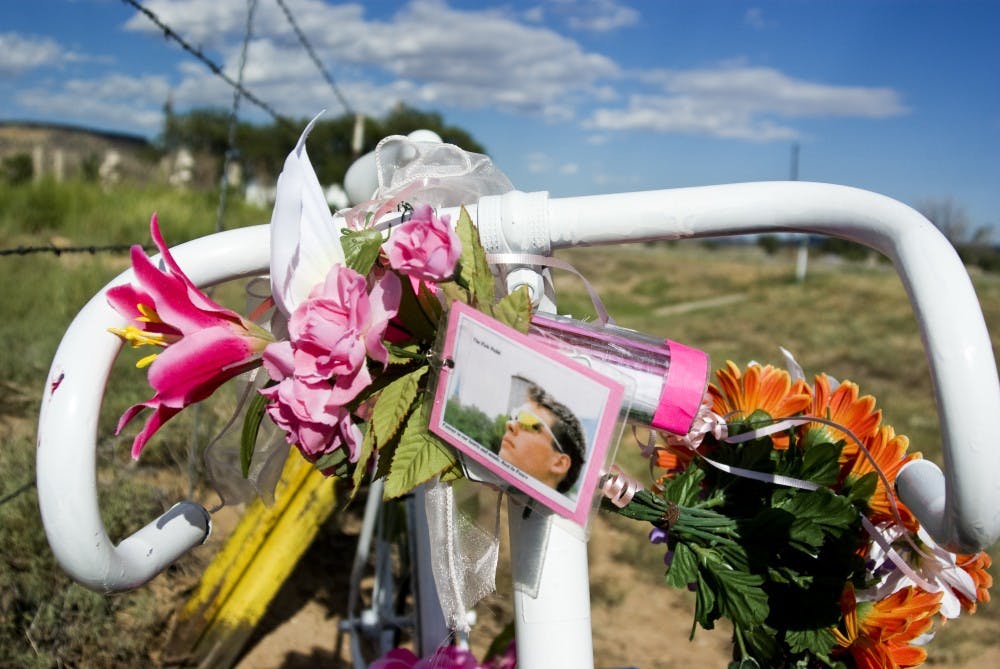He had a high spirit and was inclined to help others.
Now, John Robert Anczarski will be remembered with a memorial “ghost” bike, just a few feet away from the pavement where a motorist struck and killed the young man June 22.
The 19-year-old died after a motorist struck his bicycle in Laguna, N.M., along State Highway 124.
“The driver and the bikes were headed west. It happened so fast. The driver just ran into the bikes,” Nakia Marmon, a Laguna resident, said.
Marmon and her 15-year-old sister saw the accident. They sat with Anczarski until paramedics arrived, applying pressure to his wounds during the final hours before he died.
“I was scared. I wanted to make sure he was OK,” she said.
Chief Michelle Ray, of the tribal police department in Laguna, N.M., said the accident was referred to the U.S. Bureau of Indian Affairs, and the driver, a Laguna resident, has not been charged with any crime.
Federal and tribal bureaucracies present a lengthy process to convict the suspect. A misdemeanor is the highest sentence tribal courts can give; anything further, such as a felony conviction, is passed onto the Department of the Interior.
For now, the ghost bike is the only reminder of the tragic afternoon.
On June 20, Anczarski rode his bicycle into Albuquerque, along a route from Pennsylvania with three other cyclists to raise money for breast cancer research.
During his short visit, he went with friends and supporters of his group, The Pink Pedal, to Old Town. He met Mayor Richard Berry and rode inside a hot air balloon.
On the ghost bike, a photo that features four cyclists dressed for an eight-hour ride sits between the front spokes. Another photo, fixed into the back tire, shows Anczarski smiling. He is waving his right arm in a sky blue button-up shirt; his eyes are looking outside the camera’s frame, perhaps focused on the upcoming miles his bike will pass on the country’s pavement.
Fresh pink roses sit in front of the bicycle’s frame, and pink carnations hang from the spokes.
The bicycle was originally put in place by Hank Marmon after he saw a similar memorial.
“We were driving in Albuquerque and we saw a ghost bike on Comanche and Griegos,” Hank Marmon said. “I did some research on the Internet and found the Duke City Wheelmen Foundation. I liked the idea and built a ghost bike.”
Get content from The Daily Lobo delivered to your inbox
His research led to action. His action was a ghost bike that stood near the location where Anczarski died. Marmon’s hand-built roadside memorial is a reminder to passersby.
“There was no coverage about what he was doing,” Marmon said. “This is all about having a big heart to support, just because we didn’t know him, it doesn’t mean we can’t remember him.”
Still, problems persisted.
The NM Department of Transportation concluded the memorial was obstructing traffic, prompting a crew to drive to the scene and remove the bicycle from its location July 28.
“This is a very small community and we heard from different people that the bike was removed,” Laguna resident Johnnie Douma said. “People were upset and heartbroken that it was removed.”
Enter Jennifer Buntz, Duke City Wheelmen Foundation president.
Her nonprofit organization has installed six ghost bikes in New Mexico without permission from local municipalities. The Wheelmen organization cites a 2007 state statute that outlaws the desecration of roadside memorials, or descansos, as its legal backing.
However, in order to permanently fix the ghost bike in its location, she had to fill out paperwork with the New Mexico DOT.
“I really wanted this to happen, so it was worth it to do what it took,” Buntz said. “But I don’t want it to become the norm. If this was a different looking descanso, none of this would have happened.”
Buntz installed her first ghost bike after a friend was killed by a motorist in 2006. Her organization raises awareness about road safety.
“We all have a responsibility to play by the rules and act fairly and treat each other appropriately on the road,” Buntz said.
To this point, the ghost bike is a stark reminder to the Laguna community about the tragic event, Douma said.
“We have to live with these things internally,” he said. “We believe when you die you go in front of the creator, and at that time you decide if you are proud of the life you lived or ashamed.”






